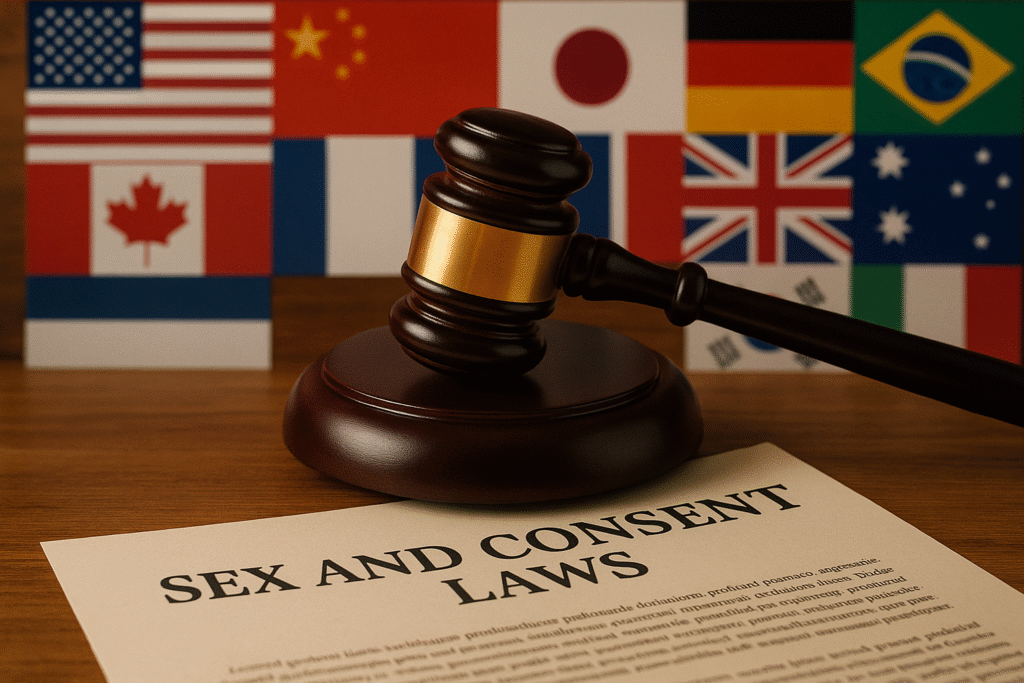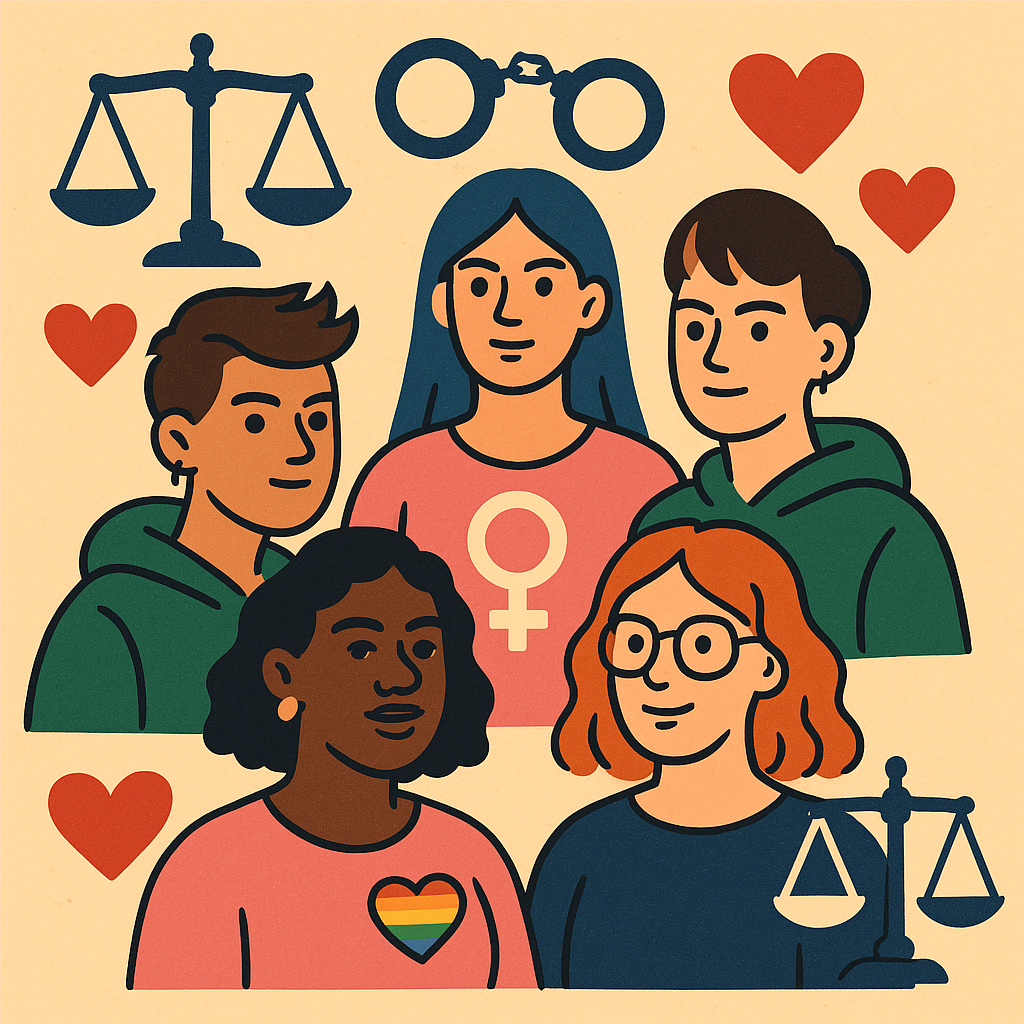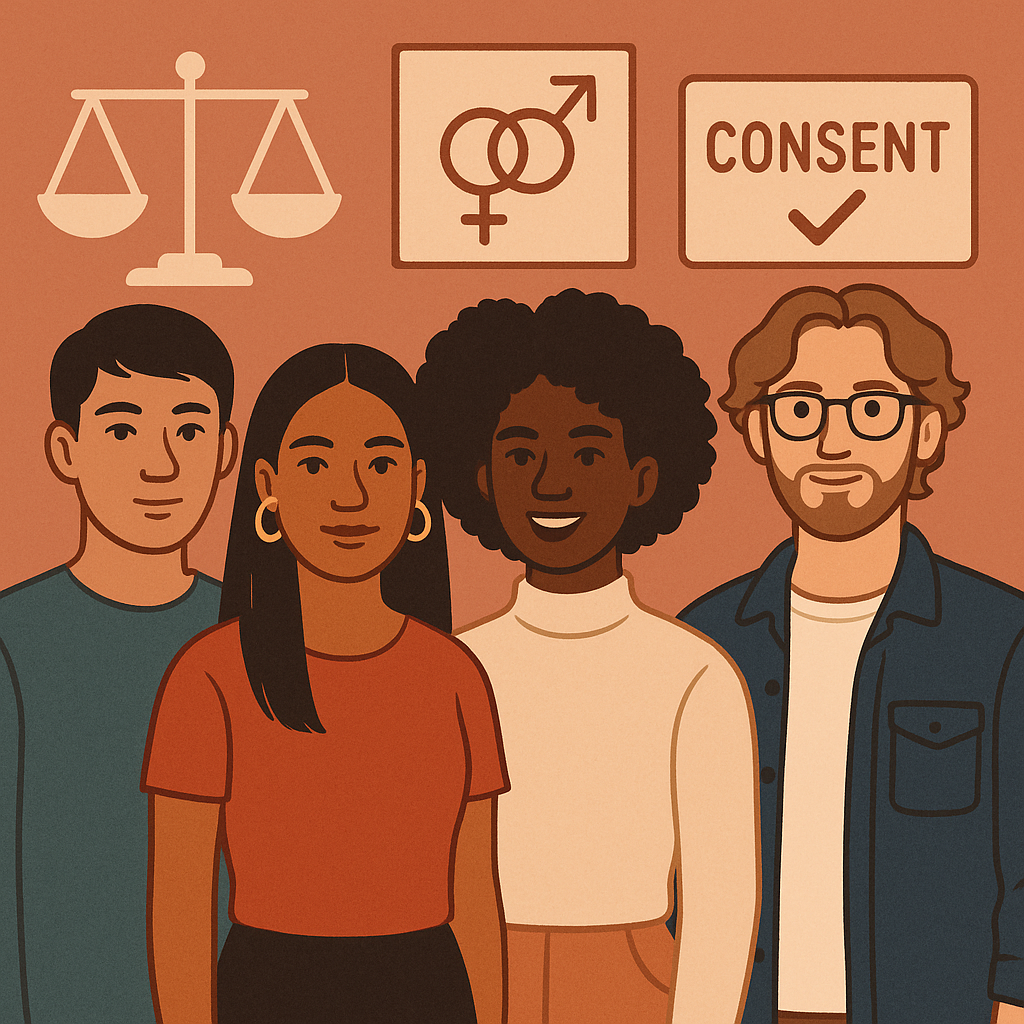In a world where sexual behavior intersects with cultural norms, human rights, and state control, “Sex and the Law” is more than just a legal topic—it’s a deeply personal, societal, and ethical issue. From the age of consent to digital sex crimes, the law attempts to regulate intimate human behavior to prevent abuse, ensure consent, and protect the vulnerable.
Whether you’re a student, educator, legal professional, or just a curious reader, this blog aims to unpack the complexities surrounding sex-related laws in India, the U.S., and globally—with clarity, responsibility, and respect.
1. What is “Sex and the Law”?

▸ Definition and Scope
“Sex and the Law” refers to the legal regulations governing sexual behavior, including issues such as consent, sexual assault, digital sex crimes, age of consent, LGBTQ+ rights, and more. It also includes the legal rights of individuals in sexual relationships, reproductive autonomy, and the legal status of sex work.
▸ Why Legal Regulation Exists
Sexuality, while deeply personal, becomes a matter of public interest when it involves:
-
Minors or people who cannot legally consent
-
Power imbalances, coercion, or manipulation
-
Public decency laws, morality codes, or religious sentiments
Hence, governments use laws to protect personal rights and prevent exploitation.
▸ Global vs Local Context
While many principles—like the need for consent—are universal, how they’re defined and enforced differs:
-
In India, marital rape remains legal in many cases.
-
In the U.S., laws vary by state.
-
Globally, LGBTQ+ rights differ widely—some countries recognize same-sex marriage, others criminalize it.
2. Consent: The Cornerstone of Sex Laws
▸ What Legally Counts as Consent?
Consent is more than just saying “yes.” Legally, valid consent must be:
-
Freely given (no force, threats, pressure)
-
Informed (clear understanding of the act)
-
Enthusiastic (mutual willingness)
-
Reversible (can be withdrawn at any time)
Silence, intoxication, fear, or confusion do not equal consent. In many countries, courts now use modern standards that prioritize affirmative consent.
▸ Age of Consent (India, U.S., and Others)
-
India: 18 years for all genders
-
U.S.: Varies by state (typically 16 to 18)
-
UK: 16
-
Japan: Raised from 13 to 16 in 2023
Even if two teenagers agree, if one is below the age of consent, it can be legally considered statutory rape.
▸ Marital Consent and Controversy
One of the most contested legal gaps globally is marital rape:
-
In India, Section 375 of the IPC still permits sex without consent if the wife is over 18.
-
In the U.S., marital rape is a crime in all 50 states, but enforcement varies.
-
Activists and human rights bodies continue to demand reform in India.
3. Key Sexual Offenses and Legal Punishments

▸ Rape, Sexual Assault & Harassment
-
India: Sections 375 & 376 (Indian Penal Code) define and penalize rape.
-
U.S.: Federal and state laws cover rape, sexual assault, and harassment.
-
Workplace Harassment:
-
India: Sexual Harassment of Women at Workplace Act, 2013
-
U.S.: Title VII of the Civil Rights Act
-
Victims can file FIRs (First Information Reports), seek protective orders, and access legal aid.
▸ Child Sexual Abuse (POCSO, U.S. Equivalents)
-
India: Protection of Children from Sexual Offences (POCSO) Act, 2012
-
U.S.: Various state and federal child protection laws
These laws ensure strict punishments, child-sensitive courtrooms, and mandatory reporting by schools, doctors, and institutions.
▸ Digital Sex Crimes
With the rise of smartphones and social media, new threats have emerged:
-
Revenge Porn
-
Sextortion
-
Non-consensual sharing of intimate images
-
Cyberstalking
Laws:
-
India: Section 66E & 67 of the IT Act
-
U.S.: Section 230 (controversial), various state laws
Offenders may face imprisonment, fines, and bans from digital platforms.
4. LGBTQ+ Rights and Legal Status

▸ Decriminalization of Same-Sex Relationships
-
India: Section 377 was struck down in 2018, decriminalizing same-sex relations.
-
U.S.: Decriminalized nationwide after Lawrence v. Texas (2003)
▸ Legal Recognition and Marriage Equality
-
India: No legal recognition yet for same-sex marriages (as of 2024).
-
U.S.: Legalized in 2015 (Obergefell v. Hodges)
-
Canada, UK, Spain: Recognized
-
Nigeria, Russia, UAE: Criminalized
▸ Discrimination Laws
LGBTQ+ individuals often face housing, employment, and healthcare discrimination.
-
India: Transgender Persons Act (2019)
-
U.S.: Supreme Court ruling in Bostock v. Clayton County prohibits workplace discrimination
5. Sex Work and the Law
▸ Legal Status Around the World
-
India: Selling sex is legal, but activities like brothel-keeping, pimping, or soliciting are criminalized.
-
U.S.: Illegal in most states, legal in some parts of Nevada.
-
Germany, New Zealand: Legal and regulated.
▸ Rights of Sex Workers
Activists call for:
-
Legal protections from abuse
-
Access to healthcare
-
Decriminalization for safety and dignity
India’s Supreme Court (2022) ruled that sex workers have equal protection under the law.
6. Reproductive and Sexual Rights
▸ Right to Abortion and Contraception
-
India: Medical Termination of Pregnancy (MTP) Act allows abortions up to 24 weeks under specific conditions.
-
U.S.: Roe v. Wade (1973) legalized abortion; overturned in 2022 (Dobbs v. Jackson), allowing states to ban it.
More than 20 U.S. states have now restricted abortion access.
▸ Forced Sterilization and State Control
In history:
-
U.S. (early 1900s): Eugenics-based sterilization of disabled people
-
India (1975–77 Emergency): Mass sterilizations
-
Modern laws ensure reproductive autonomy as a human right.
7. Sex Education and Legal Implications
▸ Legal Mandates for Sex Ed
-
U.S.: Mandated in most states; varies by curriculum (abstinence-only vs comprehensive)
-
India: Very limited; met with social resistance
-
Netherlands, Sweden: Globally recognized for progressive sex education
▸ Misinformation and Risk of Legal Trouble
-
Teens engaging in consensual sex may unwittingly break the law
-
Sexting between minors, even if consensual, can lead to criminal charges
-
Lack of education leads to coercion, confusion, and unsafe behavior
📊 Quick Legal Comparison Table
| Issue | India | U.S. | Global |
|---|---|---|---|
| Age of Consent | 18 | 16–18 | 13–18 |
| Marital Rape | Legal (over 18) | Illegal | Mixed |
| LGBTQ+ Rights | Decriminalized | Legal | Varies |
| Abortion | Legal up to 24 weeks | Restricted | Varies |
| Sex Work | Partially Legal | Mostly Illegal | Mixed |
Frequently Asked Questions
Q1. Is sex before marriage illegal in India or the U.S.?
A: No, it’s legal between consenting adults. However, societal attitudes differ.
Q2. What if someone lies about their age?
A: Even if you didn’t know, it could still result in charges for statutory rape.
Q3. Is sexting between teenagers illegal?
A: Yes, in many countries—even consensual sharing of nudes among minors is criminalized.
Q4. Can you be jailed for watching porn in India?
A: Watching adult porn privately is not illegal, but sharing or producing it is.
Q5. What protections exist for LGBTQ+ individuals in India?
A: Decriminalization exists, but no legal marriage or inheritance rights yet. Transgender protections are in place.
Conclusion: Why Legal Literacy on Sex Matters
Sexual rights are human rights. Understanding the laws around sex protects you, your partners, and your future. Ignorance isn’t just risky—it can be dangerous. Whether you’re navigating your rights, ensuring consent, or standing against abuse, knowing the law is your first defense.
As the world evolves, so must our legal systems and our awareness of them. Stay informed. Stay respectful. Stay safe.


